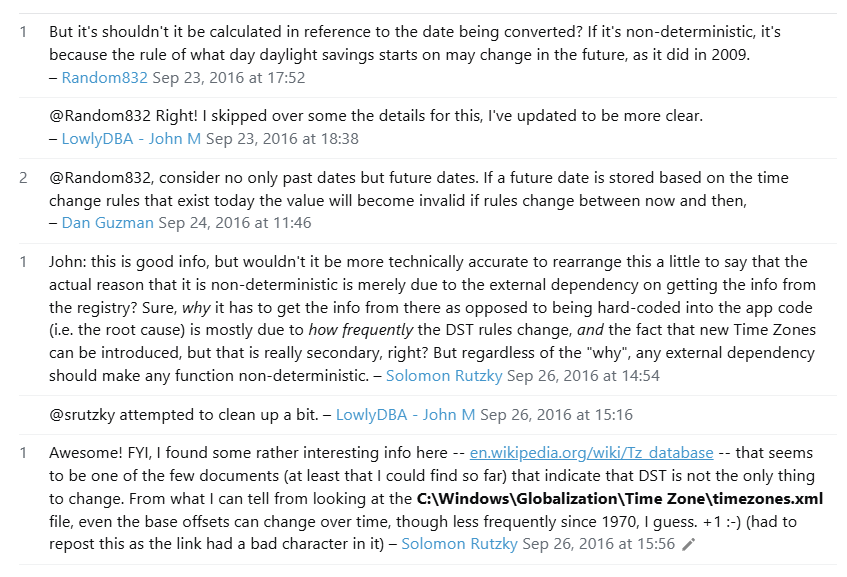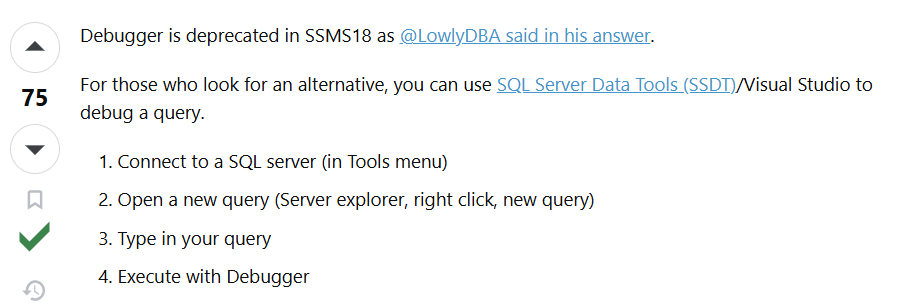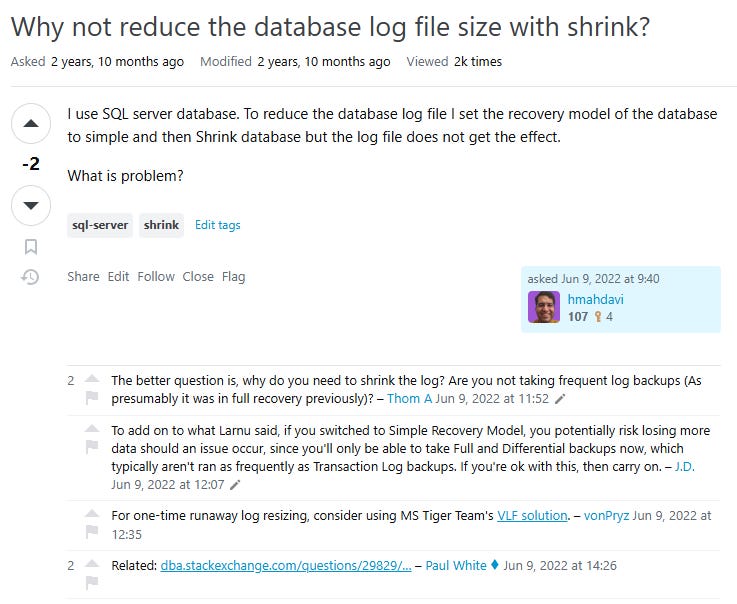My Mother Was StackExchange
Lessons in Craft, Discipline, and Humility from an Online Community.
Introduction
The title of this article, My Mother Was StackExchange, is a playful nod to the book My Mother Was A Computer by N. Katherine Hayles. Just as the book examines the surprising ways technology shapes our lives and identities, I came to see StackExchange as a kind of digital surrogate, a mentor that was both reliable and perfectly imperfect. This homage is intended in humor and earnest appreciation.
Background & Motivation
In the late 2010s I found myself as a mid-level database administrator with technical aspirations that far outstripped my station. My team was in maintenance mode most of the time, and upper management was categorically uninterested in change. Meanwhile, I was just dipping my toes into open-source software contributing for the first time, and still had the drive of youth.
At some point it became apparent to me that the best mentoring I was going to receive was not at the office, but on StackExchange. That’s where I went to learn about complex problems and seek guidance when I was totally lost. I was gaining much more from the interactions with the venerable regulars of StackExchange than anyone I shared cubicle space with.
I set a lofty goal for myself to reach 10,000 reputation points on the Database Administrator subsite of StackExchange. The DBA site was a smaller world than the main StackOverflow forum, and was frequented by a group of contributors who had earned my admiration via their consistent expertise. But with reputation points being earned in increments of 1-10 points (most often on the lower end of that scale), it was going to take a while. I figured by the end of it I’d have gotten really good at a few things, and hopefully given back to a community that had already taught me so much. By the time I reached my goal, however, I had learned skills that I could apply broadly to problem solving of any type.
The Unexpected Mentor
At first, I was at risk of falling into the trap of Goodhart’s Law - there were plenty of unanswered questions I already knew the answers to, and it only took a few minutes to post them and earn easy reputation points. This was an effective strategy in the early days, but was more of an ego booster than anything else.
Over time, what started as a simple daily ritual of answering questions for points began to change. I noticed that users with high reputation scores consistently earned more points than I did, which planted a seed of doubt: was reaching 10,000 points even a realistic goal for me?
On StackExchange reputation is primarily earned in two ways: the original poster accepts your answer, or other users upvote it. I quickly learned that getting your answer accepted often comes down to luck. And while I was getting some upvotes, the regular contributors, often upvoting each other’s work, were gaining far more traction.
That’s when I realized there was a clear path forward: I just needed to learn from what those regulars were doing. And in that moment, I found the beginning of my mentorship journey.
Stack as School
Learning Through Teaching
Answering questions often forced me to revisit topics I thought I understood. In one question, Why is AT TIME ZONE nondeterministic, I correctly answered the question the same day it was asked. However, for the next three days myself and two others (interestingly, neither of which asked the question) went back and forth in the comments on the minutiae of the topic:
Three revisions later, collectively we had an answer that was the same at a high level, but had a richer context and knowledge to impart. It ended up a much better answer than I could’ve done all on my own.
This type of exercise was humbling, educational, and blew away whatever ego I had. Each answer became a lesson, forcing me to clarify my thoughts and bridge gaps in my knowledge. In dissecting complex problems, I was compelled to define my assumptions and articulate clear, succinct explanations - a practice that not only deepened my knowledge but sharpened my communication skills.
Time-boxing and Efficiency
A critical lesson from my StackExchange journey was learning how to manage my time effectively. This was, after all, something I was often doing during downtime at my day job. Instead of getting lost in endless research and clarifying questions, I adopted a disciplined approach: if I couldn’t figure out a problem within a set time, I’d step back, document my findings in the comments, and move on.
Sometimes this meant my efforts were useful only to enable someone else to solve the problem, and sometimes they never led anywhere. But the creation of metadata around the problem statement was inherently always a good thing. It could prevent someone else from going down the wrong avenue, or indicate to someone in the future that this problem remains unsolved still. This time-boxing strategy saved time and energy for myself and others, because it centered around posterity - whatever may help answer the question in the future is worthwhile.
Answering the Question That Wasn’t Asked
Reading Between the Lines
Not every question on StackExchange is straightforward - many are cloaked in ambiguity, albeit done innocently. I began to understand that the real challenge lies not in answering what’s asked, but in identifying the unstated problem behind it. Beneath a simple query often lurked a more fundamental issue, one that required careful reading and a bit of detective work. Real world problems can be very complex and a large portion of the questions being asked are by people facing problems at their job.
In the question How to add the Debug button to SSMS v18? I answered with a straight forward response: that this button was removed in version 18 of SSMS (SQL Server Management Studio) and thus was not available. Yet the accepted answer, with almost double the upvotes to mine, was added a year later and starts out by quoting my answer in agreement. Why did this happen?
The original question asked about adding the debug button back, but what the person really meant was something akin to:
How can I use the debug feature like I used to in version 17? I can’t figure out how to do it in version 18!
The answer to that is what the accepted answer did include, and precisely why their answer was chosen by the asker, and many others, over mine.
That experience stuck with me. It reminded me that technical communication is never just about facts; it’s about empathy. The best answers anticipate the confusion behind the question, not just the syntax. Being technically right isn’t always enough, what matters more is being usefully right. That means pausing, reframing, and sometimes reading between the lines to understand the real problem someone is trying to solve.
Asking a Few Good ‘Why’s
In the limited space of comments (600 characters), every word counts. I discovered that rather than overwhelming an asker with a barrage of follow-up questions, asking one or two well-considered ‘why’ questions often unlocked the core of the problem, even if it seemingly ignored the original inquiry.
In the example above, none of the four commenters actually answered the original question. But that wasn’t negligence, it was experience. Shrinking SQL Server files recklessly is a red flag for any seasoned DBA. Rather than risk enabling dangerous behavior with a quick “here’s how,” the commenters slowed down, asked clarifying questions, and flagged the potential consequences. That instinct to probe rather than immediately prescribe makes all the difference.
To a new contributor, this kind of response (especially when paired with silence or downvotes) can feel dismissive or condescending. But more often than not, it’s rooted in genuine concern. People want to help, but they also want to prevent harm. Sometimes that means prioritizing the latter over the former.
That thread has been viewed over 2,000 times to date. A single piece of careless advice could mislead hundreds of readers. In that context, accuracy matters more than speed, and protecting future readers sometimes outweighs validating the original poster. It’s a delicate balance, but it speaks to the deeper purpose of technical communities: not just to solve problems, but to solve them responsibly.
Creating in a Disposable World
Designing Answers for Longevity
One of my favorite skills I picked up from StackExchange was the focus on the durability and longevity of the content being produced. Small efforts can lead to huge differences in the usefulness of information as it ages!
A great example of this is link rot, or the tendency of links over time to no longer point to the same resource that was originally intended. A link to a documentation page could 404 out if it refers to an older, unsupported version of software. Inside of an organization, this could be in the form of to linking to Slack messages when messages are set to expire after a certain number of months. Link rot exists in the internet and intranets around the world and affects us all.
StackExchange offers a remarkably simple and effective approach to combat this entropy:
If you use a link, also copy the relevant text directly and quote it in your answer.
If you see a broken link, update it!
This approach doesn’t just preserve context. It adds layers of resilience to the knowledge we share:
The quoted text continues to inform, even if the link rots away.
Readers can see a point-in-time snapshot and better understand how a resource has evolved.
It saves time. There is no need to dig through lengthy documents to find the key sentence.
These small acts of care may feel trivial in the moment, or even burdensome. But they’re part of a larger mindset: write like someone will read it years from now. Because odds are someone will, and when they do, your answer might be the one that still works.
The StackExchange Mindset at Work
Applying Q&A Discipline to Professional Life
What started as a self-assigned reputation challenge began to seep into my day job in subtle, but transformative, ways. I found myself treating support tickets, Slack threads, and Jira issues the same way I’d approach a StackExchange question: What is the real question? What assumptions are being made? Is this answer future-proof?
Just like on StackExchange, I began building answers that could outlive the current moment, ones that included context, reasoning, and links to authoritative sources as a baseline. I kept the audience in mind not just as the person asking, but the next person who might stumble upon the same problem. In a workplace setting, this made my documentation and internal responses far more valuable.
The ethos of DRY (Don’t Repeat Yourself) turned out to be a highly transferable skill in writing, not just software development. Clear, accurate, well-structured answers reduced repeated questions, saved me time, empowered teammates, and increased my own credibility. It taught me that good communication is a form of quiet technical leadership, even if it doesn’t always seem like it at first glance.
Embracing Corrections and Iterative Improvement
It’s not always easy to be wrong in public. But on StackExchange, much like with open-source software, it is inevitable. You will have egg on your face not once, not twice, but many many times. Sometimes someone will post a better answer. Sometimes your answer ages poorly. And sometimes, someone just points out something you flat-out missed. And that is totally alright.
Feedback-driven culture me to develop a healthy relationship with being corrected. Unlike the often slow-moving response loops at work, StackExchange can give you immediate and unfiltered responses. That can sting, but it’s also a gift. The best contributors don’t just tolerate correction - they treat it as a way to sharpen their thinking and improve the shared knowledge base. After all, who am I to nitpick a stranger who is spending their free time to aid me in solving a problem?
Over time, I became less defensive and more curious when challenged. I would probe not only the technical, but the personal factors at play. Why is this person disagreeing with me? What could I be missing? Could we both be right in different contexts?
By continuously rubber ducking with strangers, I began to uncover assumptions I didn’t realize I was making. That mindset turned into a habit, and that habit became part of my professional operating system.
I learned that publishing a less-than-perfect answer is still worthwhile, as long as you’re open to revising (and revising and revising) it. Sometimes your answer is just a stepping stone to someone else’s better, more complete solution. Improvement is iterative, and being transparent about that process doesn’t diminish credibility—it builds it.
Mentorship Through Transparency
There’s an invisible form of mentorship that happens on StackExchange. It doesn’t rely on titles or org charts. You see it in comment threads, edit histories, and thoughtful back-and-forths that rarely make it onto a resume. I’ve learned just as much from being corrected as I have from correcting. And I’ve seen others benefit when I’ve taken the time to document not just what I know, but how I arrived there.
That same mindset carries over into how I write code reviews and pull requests. I aim to show my work, not just submit it, by annotating decisions, linking sources, and explaining tradeoffs. I try to write my pull request descriptions with the same clarity I’d want in a good technical answer: direct, thoughtful, and useful to others down the line. Mentorship doesn’t have to be formal. Sometimes, the best help you can offer is simply writing something others can learn from, even if you never meet them.
Somewhere along the way, I stopped thinking of StackExchange as just a website. It was my proving ground, my writing coach, and my most reliable mentor. It didn’t always get it right, but neither did I.
While I am no longer a member of the StackExchange community for personal reasons, I’ll always appreciate everyone who was a part of it and all the lessons it taught me.



